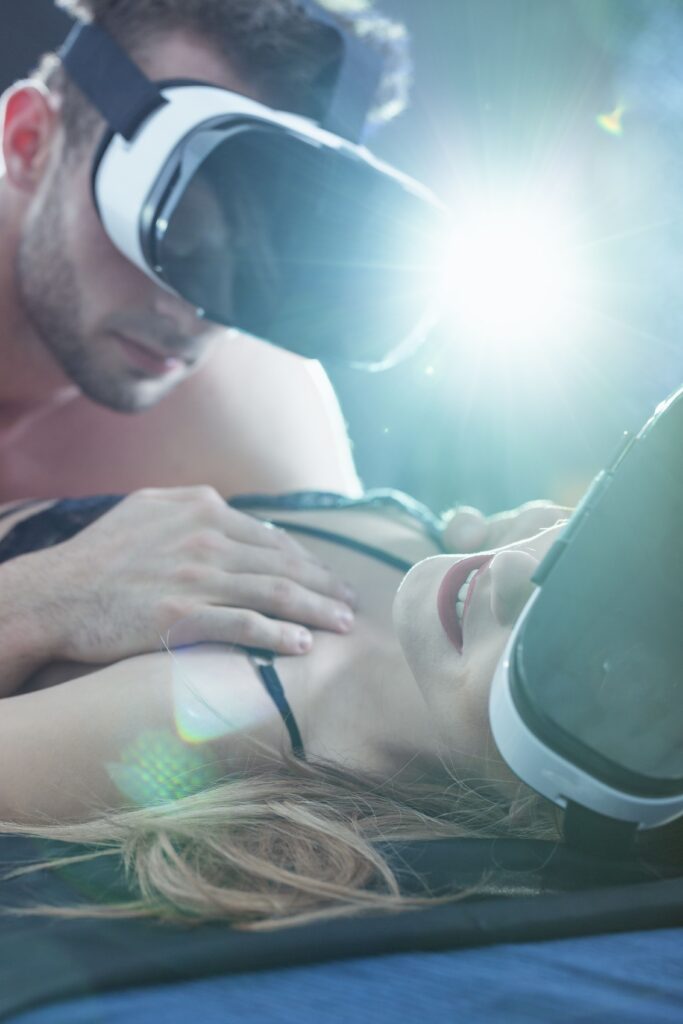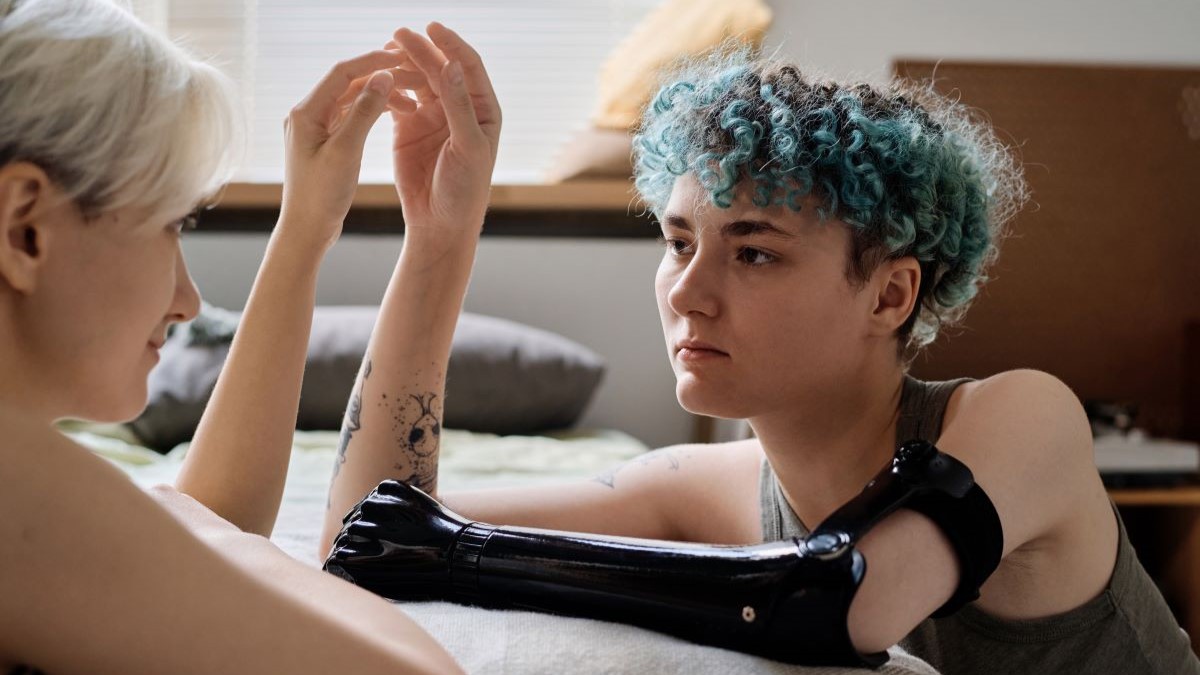From adaptive technologies to emotional connections, intimacy is evolving.
People living with disabilities have had their stories of love and sex overlooked.
Hidden behind the myth that they can’t, don’t, or shouldn’t have such stories.
According to a 2023 paper, Disabled Sexuality and Negotiations with Sexual Partners, by Sociologist, Guinevere Chambers, MA: “This myth of asexuality is everywhere, from TV shows to what we hear in the news, and it even affects how people think about those with disabilities.”
And of course, that’s simply untrue.
Individuals with disabilities experience sexual needs, desires, and fantasies just like the able-bodied community. Even if their sexual experiences may not ‘look’ or ‘feel’ similar.
“This research shines a light on the special details of disabled sex and sexuality, adding to the important conversation about the personal and heartfelt side of being close to someone when you have a disability.”
It’s time for the public to appreciate and learn the creativity applied by people with disabilities to experience intimacy.
Understanding Intimacy and Disability
People with disabilities crave a fulfilling sex life. “The existence of sexual invisibility is well established. There exists a “long-standing misconception that disabled people are asexual…”

This conversation is often overlooked because, for a while, people assumed individuals with disabilities didn’t think about or want to be in sexual or romantic relationships.
Everyone has a right to love and be loved, no matter what.
The Myth of Asexuality
Here’s the biggest myth: People with disabilities don’t have sexual feelings.
This stereotype has been around for ages: it’s wrong and unfair.
Both studies and real-life stories from people with disabilities show otherwise. They tell us about their lives and loves, providing the idea of ‘sexual invisibility’ is outdated.
Yes, they have romantic feelings and relationships – just like everyone else.
Sexuality Educator and Coach, Dr. Mitchell Tepper, Ph.D., MPH, expresses his exasperation with this harmful stereotype.
“Personally, I don’t like to perpetuate the myth that people with disabilities are asexual. I’m just tired of hearing about it and reading about it.”
The Cultural Shift
The exciting part? Things are changing!
They’re changing because of some awesome people with disabilities and their supporters. People who use social media and groups to stand up for their rights and tell their own stories. And now society is listening.
This is creating a shift in our culture.
“These findings challenge common misconceptions about disabled adults, by showing that many people with disabilities have an interest in, are capable of, deserve to experience, and enjoy having sexual relationships.”
Breathing new life into the conversation about love, intimacy and disability.
The Innovation of Intimacy
When it comes to getting close to someone, individuals with disabilities are getting very creative. They’re thinking outside of the box to show affection or feel connected to their partner.
According to Guinevere Chambers, MA “Sex as a disabled adult can be challenging for a variety of reasons, but there are also many benefits to being disabled when engaging in sexual activity.” These ‘hurdles’ are becoming unexpected advantages. People are finding innovative strategies to be intimate that might not have been considered otherwise.
Redefining Physical Connection
When it comes to being physically close, sometimes the ‘usual ways’ don’t work for everyone, especially people with disabilities. But that doesn’t stop them from finding their own approach to sharing special moments.
“There were also serendipitous benefits to being a disabled person in a sexual relationship, such as improvements in communication with partners, new approaches to choosing partners, and new possibilities during sexual encounters.”
They’re discovering new methods to make their relationships stronger.
Showing everyone when physical connection is redefined, can lead to better talking and understanding between partners – a huge win in any relationship!
Emotional Intimacy Beyond the Physical
Intimacy isn’t all about holding hands or hugging; it’s also about those deep talks and getting to know each other. For some people with disabilities, this part of their relationship gets a tremendous boost! They often must talk more openly and share more with their partners, which can make their bond super resilient.
They even “describe their communication with sexual partners as superior due to their disability status.” Claiming their conversations about “sex and sexuality as highly vulnerable and detailed”.
Dr. Tepper advises “Emotional Intimacy can be developed and nurtured by taking the risk of making yourself vulnerable and sharing those things you have been afraid to share because of shame and learning to be empathetic.”

They’re used to talking about the tough stuff, so they get really good at it, and it helps them connect on a level that’s more than just physical.
Adaptive Technologies and Intimacy Aids
When talking about technology, we often think about our phones or AI. But did you know some special technologies and tools help people with disabilities have closer relationships?
According to the research, the struggles of folks with disabilities “can often be aided by assistive devices, sex toys, medications, and human aides;” these are called adaptive technologies and intimacy aids. It’s all about using creativity and innovation to make sure everyone can experience the joy of being close to someone.
If someone finds it tough to be physically close, there are things out there that make it easier and more enjoyable.
Innovations in Assisted Devices
Assistive devices are getting more advanced and they’re doing amazing things for people’s love lives. They aren’t your everyday tools; they’re specially made to help with intimacy and disability. People who use these devices say they’re game-changers. They help people feel closer and more connected to their partners, and that’s a big deal!
They’re not just about making things possible – they’re about making things better.
The Digital Realm of Intimacy
And then there’s the digital world. Think virtual reality and online chats. They can make it feel like you’re right next to someone, even if you’re miles apart.
Dr. Tepper echoes this sentiment,
“The Internet has allowed people with disabilities to express their sexuality in ways never before possible.”
But it’s not a perfect system. Sometimes the internet can be glitchy or it might feel a bit weird not being able to touch the person you’re talking to.

The Future of Intimacy and Disability
Looking ahead, the future of intimacy for people with disabilities is full of possibilities. As we learn more, we see their experiences as positive and fulfilling.
“The reality of disabled sexuality and disabled sex is not negative – in fact, many disabled people report high levels of sexual satisfaction, long-lasting intimate relationships.”
Having a disability doesn’t stop someone from having a happy and loving relationship.
The Ripple Effect
“Nondisabled and disabled people alike can benefit from the innovation and exploration inherent to disabled sex.”
The creativity and new ideas coming from people with disabilities are teaching all of us about different mechanisms to be close. When people look for a partner who meets their needs, like someone who can help with physical stuff or might be a caretaker down the road, it shows that being thoughtful and understanding is super important in relationships.
Creating ripples and reshaping how we all think about and experience intimacy.
“You don’t have to break your neck to be a great lover, but you can learn a lot from somebody who has.”
Dr. Mitchell Tepper, Ph.D., MPH,
Featured Image Source: Shutterstock
Note from the writer: In crafting this article, our foremost intention has been to approach the topic with the utmost respect and sensitivity toward the disability community. We recognized the importance of person-first language and identity-first language for different people in the disability community. Our commitment extends beyond mere terminology; it’s about honoring the individuality and experiences of each person. We understand the language surrounding disability is nuanced and ever-evolving, and we strive to stay informed and adaptable in our reporting. Our goal is to contribute positively to the discourse surrounding disability, ensuring that our content is not only informative but also a reflection of the respect and dignity that every individual deserves.



